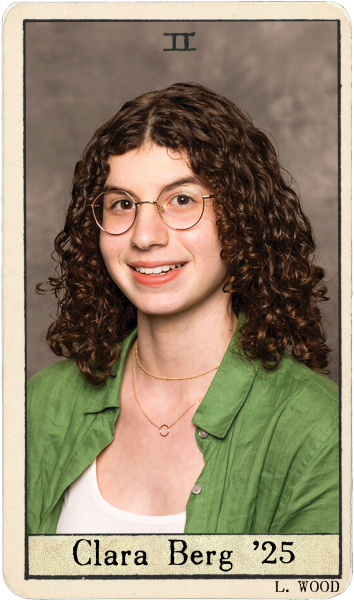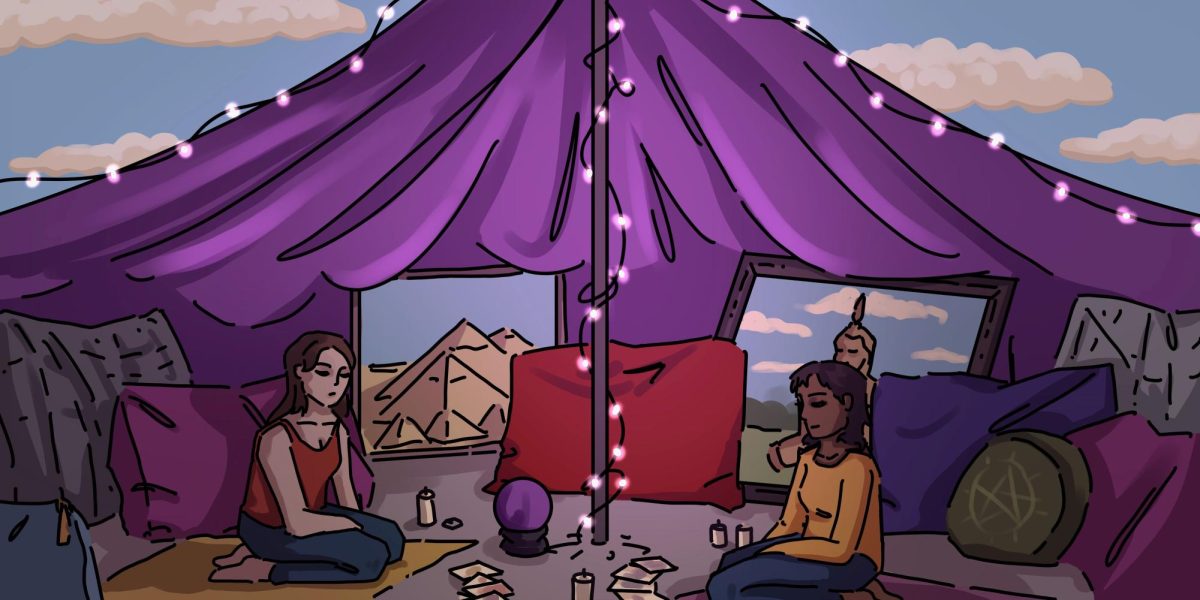Sitting in a cramped and slightly foggy booth on a plush leather chair, Librarian Kacie Cox let out a heavy sigh as she looked around. Crystals of all shapes and sizes rest on every surface. Fluorescent purple light fills the room from a single lightbulb on a stand. Even though there are three different Buddha statues surrounding her, the setting is not enough to distract from the pungent scent of sage and cigarettes.
In the small bookstore on Ventura Boulevard, a psychic dressed in a colorful wool shawl, silver turban and blue skirt peeked through the curtain and stepped inside. Cox said the woman began the palm reading with detailed questions about her life.
“She started by asking my name, what I do for a living and why [I was] there,” Cox said. “She asked, ‘What brought you to me?’ and ‘What are you interested in?’ They talk very softly in a calming voice. It’s all around just a very calm environment.”
In addition to hearing about her friends’ experiences, a psychic correctly predicted Cox’s mother would have two daughters and switch careers at a certain age. Cox said she continues to return to psychics because she has always had a positive and enlightening experience with them.
“I learned a lot about what I think about myself,” Cox said. “The psychic I went to the first time focused a lot on self-improvement and what I needed to focus on in order to reach [my] highest self. I learned a lot about the way that I love people and the way that I communicate. Even if it’s little things that I already knew, it’s affirming to hear it from someone else.”
Cox and her friends are not alone in their visit to a medium: over 70% of Americans now believe they have some sort of spiritual connection, according to Pew Research Center. In fact, 25% of millennials and 17% of Generation Z (Gen Z) consult a fortune teller for financial advice, compared to 6% for Generation X (Gen X) and 1% for Baby Boomers, according to Empower.
While she has not consulted a psychic for financial advice, Clara Berg ’25 has gone through various phases of spirituality, ranging from astrology to a personal crystal collection. At age 13, Berg began reading tarot cards to herself and her family, a spiritual practice used to gain insight into the past, present or future, according to Lifestyle Asia. Although she no longer believes in what the cards dictate, Berg said the practice adds value to her life.
“I used to think that [the tarot cards] were so profound, and that I was learning so much about myself,” Berg said. “I look at my tarot cards now, and they’re all just so broad. That’s what makes them seem so profound because they can be applied to any situation. It’s a part of self discovery to wonder and try to make sense of things.”

Along with tarot cards, Berg also used to believe she had a spiritual connection to crystals. Though she does not entirely believe in how crystals affect events, Berg said she is still open to the idea that they may have some spiritual significance.
“I have had a connection to my spirituality [ever since] I got into crystals over quarantine,” Berg said. “I believed in their properties and how some crystals are grounding. It sounds a little bit ridiculous talking about it now because they are just cool rocks. A lot of cultures have tied significance to different natural elements, so [it does] make you wonder if they’re kind of magical.”
Berg’s deeper sense of spiritual connection resulted from the COVID-19 pandemic, when the uncertainty and isolation of lockdowns drove some Americans to experiment with their spirituality. Twenty-eight percent of Americans reported stronger personal faith as a result of the pandemic, according to Pew Research Center.
After looking for recreational options while stuck at home, Amelia Chiarelli ’25 began to reflect on her spirituality. Chiarelli said many gravitated towards spirituality during the pandemic because they needed something to create a sense of order.
“This [turn to spirituality] happened to a lot of people I knew over the pandemic,” Chiarelli said. “People were feeling really lonely and shut off. A lot of people turned to spirituality [like] crystals and tarot cards to try and predict the future. In times of uncertainty, people turn to higher powers. But for our generation, that happened to be spirituality as opposed to religion. I started doing a lot of reading and research about auras and practicing it as a form of mindfulness and entertainment.”
Chiarelli said even aside from the pandemic, she thinks her peers generally turn to spiritual practices as a form of reassurance during periods of stress.
“There’s a lot of people who are comforted by the idea of being able to know the future in its entirety or even have some kind of framework that they can follow,” Chiarelli said. “Even if it is all just a placebo effect, it’s really good to help put people’s minds at ease. Just the idea that the future can be seen is really comforting.”
After growing up a Christian but never fully committing to his faith, Andrew Suh ’26 said he began to dive deeper into the teachings of Christ following social and school issues.
“Recently, I’ve been having more problems as I grow older,” Suh said. “Because I’m already a Christian, why not look a little bit deeper into what I’m supposed to believe? At first, [I thought] mass was boring, and I didn’t really get it until I started looking more and more into it. A few months later, after reading through the Bible, I look forward to reading three or four chapters each night.” 
Suh now regularly posts quotes from the Bible on his Instagram account in an effort to share his beliefs with the community, which has become increasingly less committed to religion. More than one-third of Gen Z identifies as religiously unaffiliated, making the group the least religious generation in the nation, according to the Survey Center on American Life.
In comparison to Suh’s direct pursuit of a spiritual connection, Laura McNary ’25 said she was raised Catholic and felt that her religion was a direct result of her parents’ and relatives’ influence.
“I do feel pressured to have the same religion as my family, but mostly it’s just feeling like I’m part of a community that my family is a part of as well,” McNary said. “Religion isn’t something I think about a lot. I feel like in different circumstances, I would [follow] a different religion or not [be] religious at all.”
After hearing from a female rabbi in a women’s studies course at Westlake, Rabbi Karen Bender ’84 felt inspired and served for 20 years in a synagogue before shifting to Los Angeles Jewish Home, a senior living organization. Bender said her involvement with religion in the 1980s was vastly different than what her own children have experienced.
“When I was a kid, there were only a few things to do, like playing sports, studying an instrument, dancing or going to Hebrew school,” Bender said. “But now, there are 10 million things you can do, even if you put away your screen. People care more about their extracurricular activities now than they do Hebrew school attendance. I don’t know if that’s coming from Gen Z as much as it’s coming from the way Gen X parents prioritize different things. I’m a rabbi, and I didn’t force my kids to go to Hebrew high school.”
Berg said the trend of exploring whatever kind of spirituality works best for someone may be a result of young people shifting away from the practice of organized religion toward less strict practices.
“Spirituality is a lot more free in that there are [fewer] rules,” Berg said. “Spiritual beliefs aren’t like traditional religions, and they don’t have a set of commandments or a set of rules that you have to follow. That freedom might be part of what draws Gen Z in. Spirituality is ancient, but I think it’s being rediscovered with our modern technology and our new ideas about zodiac signs or celestial bodies.”
Illustrations by Lucia Plata.































